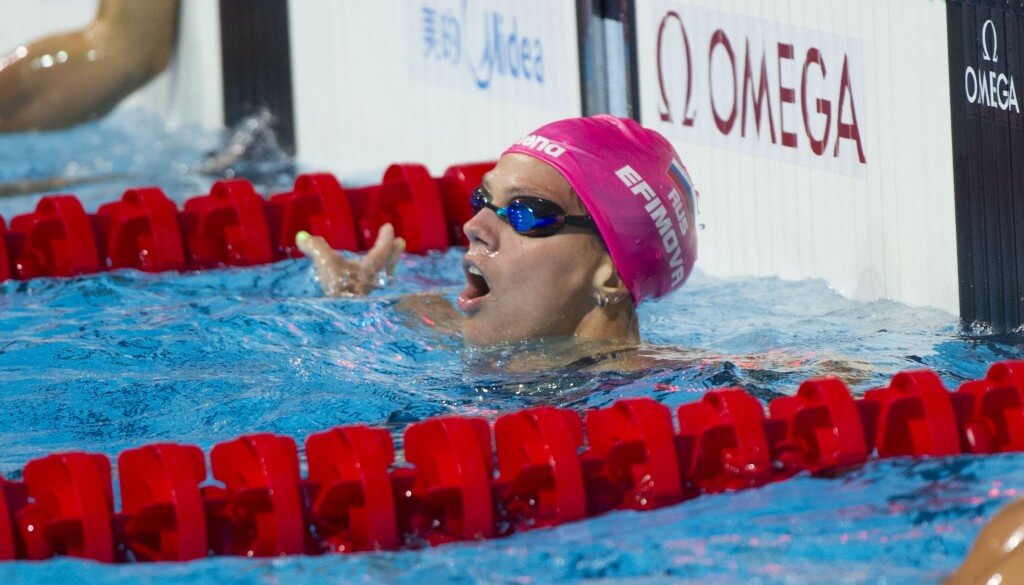Yuliya Efimova Banned for 16 Months; Stripped of World Records

LAUSANNE, Switzerland, May 13. TODAY, FINA released its final decision regarding Russia’s Yuliya Efimova and her positive test for 7-keto-DHEA during an out-of-competition test that took place in Los Angeles.
FINA elected to imposed a 16-month competition ban retroactive to Oct. 31, 2013 and concluding next year on Feb. 28. It also includes a loss of all results since Oct. 31, 2013 that includes four European short course titles and four world records.
The European short course wins now trickle down to Lithuania’s Ruta Meilutyte (50-meter breast along with her 100-meter breast win), and Rikke Pedersen Moeller (200-meter breast). Additionally, Germany finishes with the mixed 200-meter medley relay victory for the team of Christian Diener, Caroline Ruhnau, Steffen Deibler and Dorothea Brandt. Also, Denmark’s women’s 200-meter medley relay earns gold with Mie Nielsen, Jeanette Ottesen, Pernille Blume and Pedersen taking home that win with Russia losing the world record in that event.
Overall, she will lose four world records. The women’s 200-meter breaststroke record of 2:14.39 will go back to Rebecca Soni’s 2:14.57 from the Duel in the Pool. Russia will also lose the mixed medley relay and women’s medley relay records from Euro short course champs. Additionally, Efimova’s 50-meter breaststroke record from the FINA World Cup tour will not be ratified.
During her hearings with the FINA Doping Panel, Efimova plead ignorance stating that she had taken similar supplements containing L-carnitine since she was a teenager, and that a sales person at a local GNS store in Los Angeles told her that a product named Cellucor CLK was “doping-free.”
Efimova then claimed that her lack of English skills helped lead her to the poor decision to take the supplement, instead of just not taking any L-carnitine at all, especially since DHEA was “clearly listed as an ingredient on the label of the product.”
Efimova accepted that if she had compared the supplement ingredients to the banned list, she would have found that DHEA was prohibited.
One key in FINA finding some leniency and not banning Efimova for a full two years is that she detailed that her intent never was to find any performance enhancement. She purchased the product in September of 2013, went on the World Cup tour to Doha, Dubai and Moscow in October and tested clean at each of these stops.
She only used the specific product on Oct. 22 when she returned to the U.S. and had run out of her previous supply of L-carnitine. Once she began having an upset stomach that she attributed to the new product, she stopped using it and found a new supply of liquid L-carnitine, meaning that Efimova only used the product for a week. But, she wound up being tested that week on Halloween, and even detailed that she had been taking L-carnitine on her doping control form.
Outside of that test coming back positive, Efimova had later been tested two more times in 2013 in November and in December, included a test following Efimova’s world record in the 50-meter breast at the Tokyo stop of the World Cup that came back clean.
“Upon balancing all the relevant factors and after considering many other cases across a wide spectrum of sports, the FINA DP (Doping Panel) has concluded that a sixteen (16) month period of eligibility is both just and fair under the circumstances of this case.”
Further complicating the potential for Efimova to end up with just a year away from the sport is the fact that she had the chance to learn from training partner Jessica Hardy’s situation. Although Efimova was represented by Hardy’s attorney Howard Jacobs, the Trojan Swim Club’s history of positive tests were used against Efimova in the final decision.
Efimova explained that Trojan head coach David Salo “is adamantly opposed to the use of supplements of any kind,” but that fact likely went against Efimova as she should have known better when it came to using any supplements.
Efimova will likely bypass an appeal to the Court of Arbitration for Sport, and will focus on the future with the potential of still competing at the 2015 World Championships in Kazan.
“I doubt that I will appeal,” Efimova told TASS. “It requires energy, time, and most importantly, money. Moreover, I know that I made a mistake. The main thing is to start [working] for the World Championships in Kazan (2015) and the Olympic Games in Rio de Janeiro (in 2016).”



